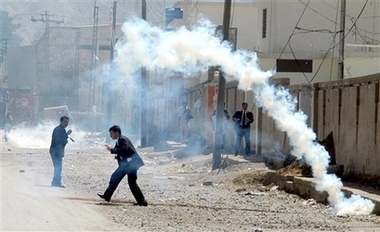Asia-Pacific
Death toll hits 70 in Pakistan clashes
(AP)
Updated: 2007-03-21 21:46
 |
Large Medium Small |
DERA ISMAIL KHAN, Pakistan - Fighting between local and Uzbek militants escalated in northwestern Pakistan on Wednesday, and the death toll from three days of clashes rose to at least 70, officials said.
 Pakistani lawyers run for shelter after police fire tear gas shell to disperse them during a an anti-government rally, Wednesday, March 21, 2007 in Quetta, Pakistan. [AP]  |
Pakistan hailed the battle as a success of its controversial aim of getting local tribesmen, rather than security forces, to crack down on foreign militants. But some observers see it primarily as a factional struggle between rival militant groups in a lawless region near Afghanistan, where sympathies for the hard-line Taliban militia run high.
"It is the result of government policy that the local tribesmen are acting against foreign militants," Interior Minister Aftab Khan Sherpao told The Associated Press.
In the first formal government confirmation of casualties, Sherpao said more than 50 people had died in the fighting, including 40 foreign militants and their local supporters. Other Uzbeks had been detained by tribesmen or surrounded, he added.
But senior intelligence and military officials, speaking on condition of anonymity because they were unauthorized to make comments to media, said about 70 had died: Some 50 Uzbeks and local supporters, and the rest local militants led by Maulvi Nazir.
The officials described Nazir as "pro-government," although he is well-known as a Taliban sympathizer.
The intelligence official said Nazir's men had given an ultimatum to the Uzbeks to leave their territory by midnight Tuesday, and had resumed attacks Wednesday after that deadline passed.
A local intelligence official put the toll even higher. He said fighting in Kalosha, Azam Warsak and Doza Ghundai villages had left 106 dead, including 78 Uzbeks, and 120 wounded.
The tribesmen have handed over 46 militants, many of them Uzbeks, to Pakistani security forces in the region's main town of Wana, and another 68 Uzbeks were still in the custody of the tribesmen, the official said.
Pakistan's government, an ally in the US-led war on terrorism, has long urged tribesmen to expel Central Asia and Arab militants from Waziristan, but with little success. Many of them shifted to Pakistan's tribal regions after the fall of the Taliban regime in Afghanistan in 2001. The region is still suspected to be a hiding place for al-Qaida leaders like Osama bin Laden and Ayman al-Zawahri.
While the motive behind the current fighting in South Waziristan remains hazy, the casualties suffered by the Uzbek fighters could ease pressure on Pakistan, which is facing fresh US concern that al-Qaida is regrouping in an area. Waziristan is also viewed as a haven for Taliban fighters attacking NATO and US forces across the border.
A clash between tribesmen and Central Asian militants in South Waziristan earlier this month killed 18 people, apparently over attempts by Uzbek militants to kill a local tribal leader.
At least two children were reportedly killed and around 20 wounded when a stray mortar round from the fighting on Monday in South Waziristan hit their school bus.
| 分享按鈕 |